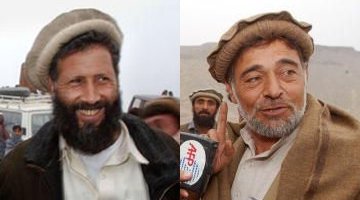By Mike Rudin, BBC, Conspiracy Files
The UK paid $2m (£1.3m) for the services of an Afghan warlord in an operation against Osama Bin Laden in 2001, it has been alleged.

Hazrat Ali (L), Haji Zaman (R)
BBC Two's Conspiracy Files heard claims from a US special forces commander that both the Americans and British paid substantial sums to Afghan warlords.
Dalton Fury added that the UK-backed warlord, Haji Zaman Gamsurek, went on to agree a ceasefire with al-Qaeda.
The Foreign Office has said it does not comment on intelligence matters.
Mr Fury told the BBC significant amounts of money were spent on procuring the services of Afghan warlords.
"General Hazrat Ali was paid $4 million to rent his leadership and his men. Haji Zaman Gamsurek supported by the United Kingdom was paid $2 million," said Mr Fury.
When the Taliban regime collapsed, Osama Bin Laden was cornered in the mountains of eastern Afghanistan, but Mr Fury said that only a tenth of the promised Afghan troops arrived.
The Afghan warlord the UK backed went on to organise a ceasefire with al-Qaeda, he said.
The CIA's head of operations in Afghanistan at the time, Ambassador Hank Crumpton, alleged some Afghan warlords were later paid off by al-Qaeda to let Bin Laden escape from Tora Bora and into Pakistan.
"Sadly, with only a handful of American forces, we relied on some of our Afghan forces.
"Some of those in retrospect we know were influenced by al-Qaeda, some were paid off and Bin Laden was allowed to escape," Mr Crumpton said.
The CIA advised against trusting the two warlords because of possible links to Bin Laden.
Backup support 'denied'
After 9/11, the Bush administration had a new military strategy for Operation Enduring Freedom.
They wanted to rely on a small number of special forces on the ground and their massive air superiority. They insisted local fighters should front the war in Afghanistan.
The strategy had worked well. Afghanistan fell in just over two months.
With Bin Laden cornered, the objective of the war was in sight, but the then US Defence Secretary Donald Rumsfeld and commander of US forces Tommy Franks insisted on sticking to the strategy, despite repeated requests for US ground troops.
The special forces on the ground and the CIA called for backup but it was denied on several occasions.
Mr Fury also claims they were denied mines and mortars, and that some troops, planes and other assets were actually withdrawn from the country just when they needed them.
"Those things collectively I think, constrained us operationally to the point where we were almost destined to failure," he says.
Instead the US and the UK relied on and paid for the services of local warlords. And it seems the world's most wanted man slipped away into Pakistan.
"There's really not a day that goes by that I don't think about the missed opportunity at Tora Bora, but it really bothers me and I really think about that hard, about what it could have been," says Mr Fury.
"Would it have stopped terrorism? No, absolutely not. Would it have stopped al-Qaeda? Possibly."



